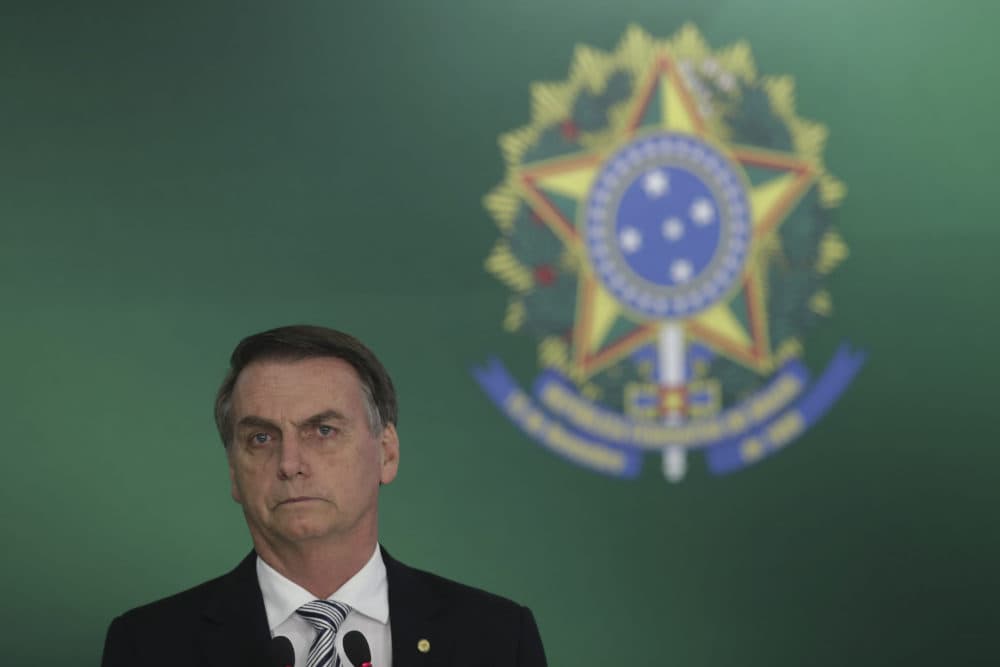Advertisement
What The Brazilian Presidential Election Means For The Amazon Rainforest

Last week, Brazilians elected Jair Bolsonaro as their new president. Bolsonaro — a nationalist who some call “Brazil’s Trump” — campaigned with the slogan "Brazil above everything, God above everyone.”
As part of his “Brazil first” platform, Bolsonaro pledged to roll back regulations protecting the Amazon rainforest and indigenous lands. His reasoning, as quoted in the New York Times: "Indigenous people want to rent out the land, they want to be able to do business, they want electricity, a dentist to remove the stumps of teeth from their mouths .… indigenous people are human beings like us. They don’t want to be used for political purposes.”
But the head of the environmental group Amazon Watch called Bolsonaro's victory a “profound setback” for ecological preservation.
Rachel Garrett, an assistant professor in earth and environment at Boston University, has been studying Brazil for about a decade. As a specialist in environmental policy, agriculture and development, she studies how to support Brazilian farmers and ranchers, while also protecting the Amazon rainforest.
WBUR called her after the election to discuss the implications of Bolsonaro’s presidency. The following Q&A has been condensed and edited for clarity.
What worries you the most about Bolsonaro’s election?
He has said that he's going to eliminate indigenous reserves, which are protected from many different types of clearing and destructive uses. He wants to substantially reduce the penalties for deforesting, and he wants to dismantle the ministry of environment, which is essential for policing environmental crimes. And he wants pull out of the Paris climate agreement.
What’s his governing philosophy? Does he want to open up Brazil for more industry, or is he just in favor of deregulation in general?
There’s been a longstanding thought that there’s a conspiracy against Brazil; that international institutions will take over the Amazon through all these environmental protections. So it’s kind of like re-securing Brazil's control over their own resources by saying, “we're not going to listen to all these international agreements saying what we can and cannot do.” And he has the exact same line as [President] Trump on the Paris climate agreement, saying it's a bad deal for Brazil, just like Trump said it's a bad deal for the U.S.
What’s his relationship to Brazil's so-called “Beef, Bible and Bullet” caucus?
He’s been supported very strongly by the interest group that represents agribusiness in Congress, and they're sometimes called the “Beef, Bible and Bullet” group. They feel like Brazil's the most regulated place in the world, which is actually true. Brazil does have the best laws on the books currently for preventing deforestation, and private companies have signed on to a moratorium not to buy from properties that have deforested. So the interest group wants to eliminate the moratorium, and they want a reduction in the environmental penalties, because they feel like they're unfairly persecuted, globally.
Would less-restrictive policies help Brazilian farmers?
His policies are actually not good for farmers, just like Trump's policies haven't been good for American farmers. Trump’s changes to trade policy in the U. S. have been hurting farmers by restricting trade with China, and Bolsonaro actually had some similar denunciations of China. China does buy a majority of Brazil’s soy products and it does invest a lot in every aspect of their resource sector. But reducing trade with China would actually just reduce incomes for farmers in Brazil.
What I would also argue is that the existing policies — although they seemed restrictive in some ways — really stimulated farmers to innovate in ways that ended up improving their incomes and increasing food production. And in addition they’re preventing deforestation. Deforestation could reduce rainfall in the region, which would in turn reduce the yields of soybeans and grasses, hurting the farmland to the south.
What might happen to the Amazon rainforest if Bolsonaro followed through with all his plans?
I think it really depends on what the private companies do. The total number of hectares of forest protected by public policies are very strong, but private policies are more stringent — they say zero deforestation is allowable. So that is a really strong protection of a forest that’s at risk of clearing from soybean and cattle. But there’s no protection for deforestation that goes towards hydroelectric dams or mining, and Bolsonaro has specifically said he's going to open up the region to mining. So I think there's going to be a lot of large-scale deforestation for mining and hydroelectric. But if the private companies stay onboard with current policies then it could still curb deforestation for agriculture.
The most recent United Nations Intergovernmental Panel on Climate Change report said that the world needs to act now in order to get down to “carbon neutral,” and avoid the worst effects of climate change. How does the Amazon rainforest, and Bolsonaro’s election, fit into this picture?
There is no way we can prevent the most catastrophic forms of climate change if we lose the tropical forests. The Amazon is the largest remaining contiguous forest in the world. If it’s not protected, and if rates of reforestation go down as well, then then we're definitely heading in the direction of more severe climate change.
